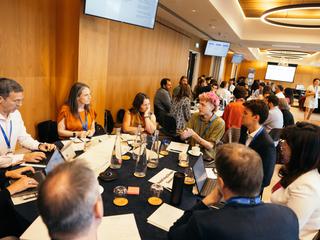In April, the Asian climate finance community converged in Singapore, for Ecosperity Week 2024. Here, Climate Arc teamed up with the Singapore Green Finance Centre (SGFC) and HSBC to host a roundtable with key financial institutions (FIs), to unpack what's needed to unlock private capital in the region.
SGFC set the scene for the discussion, by sharing insights into the regional context for the net-zero transition. Then, HSBC presented its net-zero strategy, as a tangible example of how FIs are approaching this. Finally, Arc shared its strategy: creating localized pathways, developing corporate transition analysis to support investment decision making, and building human capacity in climate finance.
In a lively and thought-provoking discussion, participants shared frank insights into what’s most needed to accelerate momentum in Asia, and the role that Arc can play in driving net-zero solutions here. During the discussion, four key themes emerged:
1. Comparable, standardized and locally specific company transition data
Data and analysis are key to creating effective climate transition strategies and enabling large-scale financing opportunities. Compared to both Europe and other parts of Asia, like China and Japan, Southeast Asia suffers from insufficient and inconsistent datasets. This is especially true for small- to medium-sized companies, which make up most businesses in the region, and contribute most to economic growth. As a result, many institutions use proxy data and estimations of data, but they’re aware of the limitations of this. Capturing transition data is essential: it provides detailed insights into the specific business risks, opportunities, and broader economic impacts associated with individual companies.

This kind of decision-critical data can drive business competitiveness and demonstrate investment impacts, which create financing opportunities for banks and asset owners. Comparable, standardized and locally specific data, which covers the relevant transition metrics, is vital when guiding companies towards and through the transition.
2. Government policies
Local governments play a vital role in meeting climate goals: they need to implement policies that drive transitions in the real economy. So far, Singapore has led this in Southeast Asia – it has a progressive regime on taxonomy, disclosure frameworks, data coordination and green financing plans. Other Southeast Asian countries with large industrial economies must make progress too, by introducing enabling policies and incentives to unlock capital. In our discussion, it was noted that a number of countries in the region don’t have sufficient nationally determined contributions, and that information about what transitions are taking place, or how to achieve them through policies, isn’t available.
FIs would benefit from engagement with regulators, to solidify regulatory guidelines and harmonize them with international standards, including disclosure requirements. They should also be in dialogue with policymakers about the development of policy interventions, like carbon pricing, energy infrastructure plans, and energy efficiency standards, to incentivize companies to transition.

3. Capacity building
For financial decision makers in Southeast Asia - from thousands of client-facing managers at banks, to asset owners deciding on investments - understanding the impact of transitions on their financing exposure is a key area where additional capacity is needed. In addition to educating their own workforce, banks and investment firms are also educating businesses through their engagement. Integrating corporate transition analysis into decision making goes beyond basic ESG training - it requires hands-on learning to understand business dynamics, policy interventions, the pace of transition and value chain impacts.
4. Local pathways
Earlier this year, the International Energy Agency announced that its first local office, the first outside its Paris headquarters, will be opened in Singapore. The market welcomed this: it speaks to a growing, global recognition that Asia is key to the global transition, and it also reflects the need for localized climate information and analytics. Companies are generally assessed against global and sectoral pathways, but these assessments must be supplemented with localized context on the pace of transition, policy and infrastructure hurdles, and demand signals.
Additionally, given the growing, energy-dependent economies in the region, these assessments must consider the loss and creation of jobs, as well as energy security, access and affordability. It's vital that financial decision makers know what a good transition looks like, and what milestones businesses must hit for sustainable economic growth.

Next steps
In the global effort to meet the Paris Agreement's goals, while ensuring economic prosperity, Asia plays a crucial role. Yet the challenge looms large: to meet global climate goals, the Asia-Pacific region requires between $1.1 and $2.6 trillion per year of investments until 2050.
While the discussion did not reflect all the voices in the ecosystem, it did create a strong sense of the essentials required to shift capital to solutions on the ground. For Arc, it confirmed gaps that we'd anticipated in the local climate finance ecosystem, and solidified the strategic direction that we plan to take in the region. For SGFC, the findings helped focus the ongoing development of research and capacity building, with which the Centre engages the financial industry to fund Asia’s energy transition.
Going forward, Arc plans to build on this conversation: we plan to forge strategic partnerships with mission-aligned initiatives in Southeast Asia. Together, we can build the necessary data and analysis with which to assess localized transitions, and build the capacity and skillsets needed to shift private capital.
We will do this while continuing to listen to financial decision makers locally and globally, so that our contribution to the solution is fit for purpose - to shift capital toward a safer, greener future, at speed and at scale.

Join the conversation
If you're interested in hearing more, or if you'd like to get involved, please get in touch.




